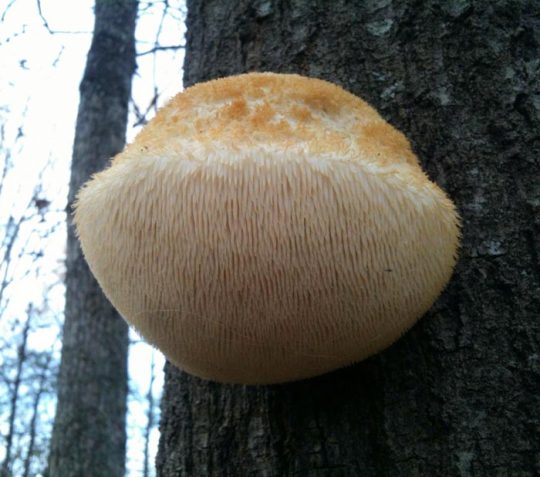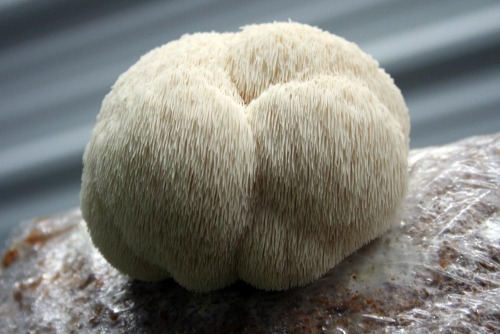#lions mane

1. Enhances Brain Function
Maybe the most thoroughly researched feature of lion’s mane mushroom is its impact on brain cells and related functions. This incredible fungus may have revolutionary impact on neurodegenerative diseases.
One method by which lion’s mane affects brain function is by enhancing “neurite outgrowth” in the brain and related organs, according to research published in the International Journal of Medicinal Mushrooms. (3,4) Neurite outgrowth refers to the growth of axons and dendrites from neurons (anybody’s high school biology classes coming back?).
That’s a big deal in brain health research. By increasing this growth, it could potentially be possible to slow or reverse cell degeneration in the brain — the main characteristic of diseases like Alzheimer’s and Parkinson’s.
A 2012 study conducted in Malaysia found that consuming lion’s mane mushroom could actually regenerate damaged cells from peripheral nerve injury, an injury affecting the delicate tissue between your brain and spinal cord. (5)
When studying how brain diseases might be affected by particular medications or treatments, scientists often use what is known as the PC12 cell line for testing. Extracts and various forms of lion’s mane mushroom seem to have a major impact on PC12 cells, protecting them from damage and delaying their cell death significantly. This finding may prove to be extremely relevant for prevention or treatment of brain conditions. (6,7,8)
In animal research published in Evidence-Based Complementary and Alternative Medicine, lion’s mane mushroom stimulates cognitive function and helps improve memory in rats, both with and without an Alzheimer’s model. (9) Multiple studies have found an inverse correlation between lion’s mane and Alzheimer’s-related symptoms, meaning that after consuming the mushroom extract, the rats’ symptoms improved. (10,11)
An improvement of mild cognitive impairment in humans was also found in research published in Phytotherapy Research after eight to 16 weeks of lion’s mane supplementation, although this improvement did not last after subjects stopped taking this supplement. (12)
The danger of ischemic injury (damage caused by a lack of blood flow) to neurons is also of significance when you’re talking about brain damage and disease. In laboratory tests conducted in Taiwan, lion’s mane mushroom has been shown to help prevent this type of injury. (13)
Taking supplements of lion’s mane has also been found to have potentially protective effects on the spread of Parkinson’s disease, another neurodegenerative disorder, according to research published in the Journal of Translational Medicine. (14)
While this research is still in its infancy and has not progressed to large-scale human trials in most cases, the consistent effect lion’s mane mushroom has been found to have on brain cells should not be ignored.
2. May Protect Against Cancer
Lion’s mane may also be significant in treating cancer, according to a host of research. (15) In varying degrees, compounds from or supplementation with lion’s mane mushroom has been found to potentially slow the progression or reverse the spread of: leukemia cells in a Korean study. (16) Further Korean research conducted by the Department of Molecular Science and Technology at Ajou University found that thanks to the phytochemicals in lion’s mane mushroom, it has “therapeutic potential against human leukemia.” (17)
As far as gastric cancer is concerned, a study published in the International Journal of Biological Macromolecules found that lion’s mane caused cell death and cell cycle arrest with gastric cancer. The researchers concluded, “our study provides in vitro evidence that HEG-5 may be taken as a potential candidate for treating gastric cancer.” (18)
Studies published in the Journal of Natural Products and Kaohsiung Journal of Medical Sciences unearth the ability of lion’s mane mushroom to treat lung cancer. (19,20) Meanwhile, according the Journal of Biomedicine and Biotechnology and the Journal of Ethnopharmacology, lion’s mane exhibits anticancer activity against colon, breast and other cancers as well. (21,22)
Some studies actually suggest the use of lion’s mane mushroom supplements to treat cancer, although long-term and large-scale studies haven’t been conducted to prove that as a viable option.
Another interesting finding involved the metastasis (cancer spreading) from the colon to the lung. When a cancer spreads to more than the original organ in which it was found, a patient is considered to have stage IV cancer. In a study conducted on rats out of Korea, rats were given either hot water lion’s mane extract or microwaved ethanol extracts of lion’s mane mushroom. By consuming lion’s mane extract, the rats studied showed inhibited metastasis of cancer cells to the lungs by 66 percent and 69 percent, respectively. (23)
3. Supports Heart and Circulatory System Health
Lion’s mane mushroom might also help you in preventing heart disease. Research has found that extracts of lion’s mane can prevent the increase of LDL cholesterol (sometimes referred to as “bad” cholesterol), increase HDL, or “good,” cholesterol and lower triglycerides in the bloodstream, an early indicator of heart disease. (24,25)
Stroke, a lack of blood supply to the brain from the heart, is sometimes caused by blood clots. It’s also related to atherosclerosis, a serious heart condition. An extract of lion’s mane mushroom may be able to prevent blood clots and help to reduce the risk of stroke, according to a study by from the Department of Cellular Signaling, Graduate School of Pharmaceutical Sciences at Tohoku University in Japan. (26)

4. Might Improve Digestive Health
Due in part to its powerful anti-inflammatory properties, lion’s mane mushroom might improve the function of your stomach and digestive system.
In multiple studies, lion’s mane mushroom has been shown to protect from or shrink gastric ulcers. For instance, according a study conducted on rats by the Mushroom Research Centre at the University of Malaya in Malaysia, researchers concluded the bioactive compounds in lion’s mane extract may be responsible for the gastroprotective activity exhibited on the rats. (27) Research from China published in the International Journal of Medicinal Mushrooms confirms this, noting that “results indicate that the polysaccharide fraction is the active component of the H. erinaceus mycelium culture, which protects against gastric ulcers.” (28)
Lion’s mane may also significantly improve symptoms of two major inflammatory disorders of the digestive system, gastritisandinflammatory bowel disease. (29,30)
5. Reduces Inflammation
Although it’s a relatively different way of looking at health, research on natural ways to reduce inflammation is a major way natural health practitioners help prevent disease.
A 2015 study out of Japan found that lion’s mane mushroom was able to reduce inflammation in fatty tissue. This is important because fatty tissue inflammation is a factor in the formation of metabolic syndrome, a cluster of conditions that increase your risk of heart disease, stroke and diabetes. (31)
Lion’s mane also has antibacterial effects against h. Pylori, often considered “the most successful pathogen in human history.” Many people never have symptoms of carrying the bacteria, but for some people it causes severe gastric conditions, like ulcers in the stomach and/or intestines.
6. Acts as a Powerful Antioxidant
Fighting free radical damage has a number of health benefits, including the prevention of disease. The molecules in lion’s mane mushroom have antioxidant abilities and help prevent and relieve the oxidative stress caused by poor nutrition and exposure to chemicals in the environment. (34,35)
One specific way these antioxidants may be useful is in the healing of wounds. A study at the University of Malaya found that a liquid extract of lion’s mane sped up wound healing significantly compared to natural healing in rats. (36)
7. Improve Mental Health and Overall Well-Being
A lion’s mane mushroom supplement may also help you to feel better by improving sleep and reducing the effects of mental health issues.
The powerful polysaccharides extracted from lion’s mane have been shown to fight fatigue in mice trials. (40) They also might have the ability to adjust circadian rhythms back to normal, as they did on mice in a study conducted at the Department of Agro-environmental Sciences, Faculty of Agriculture at Kyushu University, which is particularly significant for people who are at risk for dementia. (41)
Consuming lion’s mane mushroom may also be a natural remedy for depressionandanxiety. Thirty women were given either a placebo or lion’s mane for four weeks. Researchers concluded, “Our results show that HE intake has the possibility to reduce depression and anxiety and these results suggest a different mechanism from NGF-enhancing action of H. erinaceus.” (42) This seems to be related, in part, to the inflammation factor related to depression, as shown in mice studies. (43)

8. Improves Immune Function
It’s important to know how to boost your immune system so your body can fight infection well. Lion’s mane seems to have the ability to enhance immune system function in a manner also related to the polysaccharide content in the fungus, according to research performed on mice. (44)
9. Might Be Useful for Managing Diabetes
A 2013 animal study showed marked improvement in blood glucose levels, insulin sensitivity and various other diabetes symptoms when an extract of lion’s mane mushroom was given to them. (45)
Possibly because of the antioxidant activity of lion’s mane, administering it to animals also seems to relieve pain caused by diabetic neuropathy.
>>>Always buy only products that contain more than 30% polysaccharides, preferably up to 50%.<<<
Oh, and btw there´s a guy who plays synths with mushrooms:
Lauren Nixon does it again. This time, she spiced up brunch with Chili Spiced Lion’s Mane Mushrooms to accompany a Sunday breakfast made with all things local. Lauren volunteers a lot with the members of our farm cooperative so she’s kinda a pro at working with new veggies. Still, she’s great at creating approachable recipes for busy people. Love it!
At the farmer’s market table, we get the most questions about this one so I’m thrilled to have something simple and delicious to point folks to. Happy Breakfast and keep up with Lauren’s adventures here.
Want a closer relationship with your farmer? Live in the DC area? Contact us for winter workshops, garden and farm consulting or to get on information about out Community Supported Agriculture program.
Post link
Oh what a lovely surprise! Our farmer’s market neighbor Anne Pugliese of A Little Chef A took home a Lion’s Mane Mushroom and made the most amazing pasta dish with it!
There are a few things I love about this recipe. First of all, there are only 5 ingredients, most of which we could see ourselves having around the house on a rainy Sunday. Simplicity makes a busy farmer’s heart go pitter-patter.
Second, Anne mixed it with a Sweet Potato Pasta! We absolutely LOVE this flavor combo. Seriously, had it on pizza last night.
Finally, Anne conquered her slight fear of trying a new and weird looking mushroom! Way to face your fungi Anne! Check out how Anne tamed the Lion’s Mane here.
DC Chefs who blog! Wanna get in on the action? Email us about how you can get the goods to let your imagination run wild! [email protected]
Photo Credit: A Little Chef A
Post link


some more mushroom designs ❤︎


some more mushroom designs ❤︎




Mindblown




